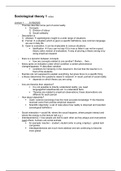Sociological theory 1 notes
Lecture 1 31/08/2020
- Theories describe some part of social reality
Concepts
1) Division of labour
2) Social solidarity
- Description is
1) Abstract applied/gives insight to a wide range of situations
2) Formal a situation which is given a specific definitions, less common language
we use in daily life
3) Open to evaluation; it can be implacable to various situations
falsification if you can not say if it is true or false it can not be a good
theory (strict version of evaluation). A way of proving a theory wrong is by
doing empirical research
- there is a dynamic between concepts
how are concepts related to one another? If/when… then…
- theory gives an indication under which condition a certain phenomenon
changes/appears describes variation
conditions for hierarchy in the classroom: the fact that the teacher is in
front of the students
- theories are not supposed to explain everything, but gives focus to a specific thing
- a theory determines the questions raised in research result: portrait of social reality
depends on which theory you are using
- how are theories then objective?
It is not possible to directly understand reality; you need
language/formulas/theories etc. to understand facts
Theories are related to empirical observations; these observations are
different for each person
- How about objectivity?
Claim: science (sociology) has the most accurate knowledge the theories
received come from precise empirical research
Scientific objectivity: a set of rules about how reality is observed and reported
(sociological definition)
- Social interaction = social life, where the social happens, where people interact and
where the energy is (the lecture hall e.g.)
- Interdependency = how people are tied to each other as they always and everywhere
need others, humans are social animals
for example: teacher – student, student (who is using a laptop) – global tech
companies
interdependencies are much more abstract and are continuing to become
more global
, - people are oriented to react to one another
you tend to monitor people around you without giving that impression
‘Social action, which includes both failure to act and passive acquiescence,
may be oriented to past, present, or expected future behaviour of others’
(Weber 1914 in Calhoun Classical, p.287) in the beginning, so the very
slight action you do for something else is already a form of interaction
Blumer people also act on meanings, so they sense meanings (meanings
change)
- Interdependence: mutual dependence between people
- 4 basic types
1) Cognitive: knowledge
depending on someone’s knowledge in the broadest sense, about how people
orient themselves. From knowledge people can sense to react in some
situations!!. We learn from others.
2) Affective: emotion
Taking care of one another, love, friendship, also in the lecture hall (emotional
bond; if the lecture went well etc.), hate
3) Political: physical coercion and protection
The use of physical force, related to police and state (Netherlands), in smaller
states they look up to strong man who indicates protection, gangs in smaller
neighbourhoods, make people dependent of you by extracting your power and
ask for money
4) Economic: scarce resources
Material issues; income, teacher’s job is depending of the students’ tuition
- Most of the time is one party more dependent than the other one asymmetrical
dependency power balance
- Émile Durkheim on the social division of labour
- he discovered a relations between the type of social solidarity (a lot of things can be
put under that label and Durkheim had a specific idea of that) and the degree of
labour division (BART clips) at the core what the theory is about
- he made the insight of economics (Adam Smith) bigger by using his sociological
insights ‘
- specialization? various domains of society are taking up specific tasks and the
difference between males and females
- ties between people become more specific they become less thick
imagine a small scaled society, they do not have very much contact with other
communities, all the four interdependencies rely on the same persons (lumped
together in the social interaction between the people in the community)
after the development a person will only depend on another for one specific
thing
marriage then was an interdependency of an economic side and a romantic
side after the development it could be the one of the other
Durkheim’s discovery thinning out of the interdependencies (crucial
movement)
- Durkheim’s fascination is about moral order: right or wrong?
he finds that it should be studied by empirical research by sociologists
- human nature: people have endless desires and needs (if people will be set loose,
they will be unhappy) so people are unfree by nature because they keep on
longing new things
- society’s moral order limits the endless pursuing of desires
without moral order (society) people will pursue their own interests (out of their
own egoistics)




